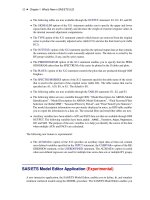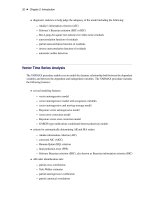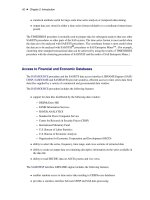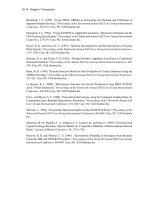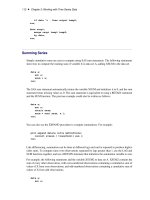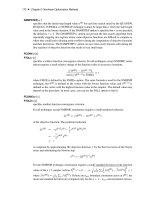SAS/ETS 9.22 User''''s Guide 92 pptx
Bạn đang xem bản rút gọn của tài liệu. Xem và tải ngay bản đầy đủ của tài liệu tại đây (159.11 KB, 10 trang )
902 ✦ Chapter 16: The LOAN Procedure
You use the following statements to find the breakeven point in the life of the loan for your preference
between the loans:
proc loan start=1992:1 nosummaryprint amount=100000 life=360;
fixed rate=8.25 label='8.25% - no discount points';
fixed rate=8 points=1000 label='8% - 1 discount point';
compare at=(48 54 60) all taxrate=33 marr=4;
run;
Output 16.1.1 shows the loan comparison reports as of January 1996 (48th period), July 1996 (54th
period), and January 1997 (60th period).
Output 16.1.1 Loan Comparison Reports for Discount Point Breakeven
The LOAN Procedure
Loan Comparison Report
Analysis through JAN1996
Ending Present Worth Interest
Loan Label Outstanding of Cost Payment Paid
8.25% - no discount 96388.09 105546.17 751.27 32449.05
points
8% - 1 discount point 96219.32 105604.05 733.76 31439.80
Loan Comparison Report
Analysis through JAN1996
True
Loan Label Rate
8.25% - no discount 5.67
points
8% - 1 discount point 5.69
NOTE: "8.25% - no discount points" is the best alternative based on present
worth of cost analysis through JAN1996.
Example 16.1: Discount Points for Lower Interest Rates ✦ 903
Output 16.1.1 continued
Loan Comparison Report
Analysis through JUL1996
Ending Present Worth Interest
Loan Label Outstanding of Cost Payment Paid
8.25% - no discount 95847.27 106164.97 751.27 36415.85
points
8% - 1 discount point 95656.22 106153.97 733.76 35279.26
Loan Comparison Report
Analysis through JUL1996
True
Loan Label Rate
8.25% - no discount 5.67
points
8% - 1 discount point 5.67
NOTE: "8% - 1 discount point" is the best alternative based on present worth of
cost analysis through JUL1996.
Loan Comparison Report
Analysis through JAN1997
Ending Present Worth Interest
Loan Label Outstanding of Cost Payment Paid
8.25% - no discount 95283.74 106768.07 751.27 40359.94
points
8% - 1 discount point 95070.21 106689.80 733.76 39095.81
Loan Comparison Report
Analysis through JAN1997
True
Loan Label Rate
8.25% - no discount 5.67
points
8% - 1 discount point 5.66
NOTE: "8% - 1 discount point" is the best alternative based on present worth of
cost analysis through JAN1997.
Notice that the breakeven point for present worth of cost and true rate both happen on July 1996.
This indicates that if you intend to keep the loan for 4.5 years or more, it is better to pay the discount
points for the lower rate. If your objective is to minimize the interest paid or the periodic payment,
the “8% - 1 discount point” loan is the preferred choice.
904 ✦ Chapter 16: The LOAN Procedure
Example 16.2: Refinancing a Loan
Assume that you obtained a fixed rate 15-year loan in June 1995 for $78,500 with a nominal annual
rate of 9%. By early 1998, the market offers a 6.5% interest rate, and you are considering whether to
refinance your loan.
Use the following statements to find out the status of the loan on February 1998. Output 16.2.1
shows the results:
proc loan start=1995:6;
fixed life=180 rate=9 amount=78500 noprint
label='Original Loan';
compare at=('10FEB1998'd);
run;
Output 16.2.1 Loan Comparison Report for Original Loan
The LOAN Procedure
Loan Comparison Report
Analysis through FEB1998
Ending Interest True
Loan Label Outstanding Payment Paid Rate
Original Loan 71028.75 796.20 18007.15 9.38
The monthly payment on the original loan is $796.20. The ending outstanding principal balance as
of February is $71,028.75. At this point, you might want to refinance your loan with another 15-year
loan. The alternate loan has a 6.5% nominal annual rate. The initialization costs are $1,419.00. Use
the following statements to compare your alternatives:
proc loan start=1998:2 amount=71028.75;
fixed rate=9 payment=796.20
label='Keep the original loan' noprint;
fixed life=180 rate=6.5 init=1419
label='Refinance at 6.5%' noprint;
compare at=(15 16) taxrate=33 marr=4 all;
run;
The comparison reports of May 1999 and June 1999 in Output 16.2.2 illustrate the break even
between the two alternatives. If you intend to keep the loan through June 1999 or longer, your
initialization costs for the refinancing are justified. The periodic payment of the refinanced loan is
$618.74.
Example 16.2: Refinancing a Loan ✦ 905
Output 16.2.2 Loan Comparison Report for Refinancing Decision
The LOAN Procedure
Loan Comparison Report
Analysis through MAY1999
Ending Present Worth Interest
Loan Label Outstanding of Cost Payment Paid
Keep the original loan 66862.10 72737.27 796.20 7776.35
Refinance at 6.5% 67382.48 72747.51 618.74 5634.83
Loan Comparison Report
Analysis through MAY1999
True
Loan Label Rate
Keep the original loan 6.20
Refinance at 6.5% 6.23
NOTE: "Keep the original loan" is the best alternative based on present worth
of cost analysis through MAY1999.
Loan Comparison Report
Analysis through JUN1999
Ending Present Worth Interest
Loan Label Outstanding of Cost Payment Paid
Keep the original loan 66567.37 72844.52 796.20 8277.82
Refinance at 6.5% 67128.73 72766.42 618.74 5999.82
Loan Comparison Report
Analysis through JUN1999
True
Loan Label Rate
Keep the original loan 6.20
Refinance at 6.5% 6.12
NOTE: "Refinance at 6.5%" is the best alternative based on present worth of
cost analysis through JUN1999.
906 ✦ Chapter 16: The LOAN Procedure
Example 16.3: Prepayments on a Loan
This example compares a 30-year loan with and without prepayments. Assume the $240,000 30-year
loan has an 8.25% nominal annual rate. Use the following statements to see the effect of making
uniform prepayments of $500 with periodic payment:
proc loan start=1992:12 rate=8.25 amount=240000 life=360;
fixed label='No prepayments';
fixed label='With Prepayments' prepay=500;
compare at=(120) taxrate=33 marr=4 all;
run;
Output 16.3.1 Loan Summary Reports without Prepayments
The LOAN Procedure
Fixed Rate Loan Summary
No prepayments
Downpayment 0.00 Principal Amount 240000.00
Initialization 0.00 Points 0.00
Total Interest 409094.17 Nominal Rate 8.2500%
Total Payment 649094.17 Effective Rate 8.5692%
Pay Interval MONTHLY Compounding MONTHLY
No. of Payments 360 No. of Compoundings 360
Start Date DEC1992 End Date DEC2022
Rates and Payments for No prepayments
Date Nominal Rate Effective Rate Payment
DEC1992 8.2500% 8.5692% 1803.04
Output 16.3.2 Loan Summary Reports with Prepayments
The LOAN Procedure
Fixed Rate Loan Summary
With Prepayments
Downpayment 0.00 Principal Amount 240000.00
Initialization 0.00 Points 0.00
Total Interest 183650.70 Nominal Rate 8.2500%
Total Payment 423650.70 Effective Rate 8.5692%
Pay Interval MONTHLY Compounding MONTHLY
No. of Payments 184 No. of Compoundings 184
Start Date DEC1992 End Date APR2008
Example 16.4: Output Data Sets ✦ 907
Output 16.3.2 continued
Rates and Payments for With Prepayments
Date Nominal Rate Effective Rate Payment
DEC1992 8.2500% 8.5692% 2303.04
Output 16.3.3 Loan Comparison Report
The LOAN Procedure
Loan Comparison Report
Analysis through DEC2002
Ending Present Worth Interest
Loan Label Outstanding of Cost Payment Paid
No prepayments 211608.05 268762.31 1803.04 187972.85
With Prepayments 118848.23 264149.25 2303.04 155213.03
Loan Comparison Report
Analysis through DEC2002
True
Loan Label Rate
No prepayments 5.67
With Prepayments 5.67
NOTE: "With Prepayments" is the best alternative based on present worth of cost
analysis through DEC2002.
Output 16.3.1 through Output 16.3.3 illustrate the Loan Summary Reports and the Loan Comparison
report. Notice that with prepayments you pay off the loan in slightly more than 15 years. Also, the
total payments and total interest are considerably lower with the prepayments. If you can afford the
prepayments of $500 each month, another alternative you should consider is using a 15-year loan,
which is generally offered at a lower nominal interest rate.
Example 16.4: Output Data Sets
This example shows the analysis and comparison of five alternative loans. Initialization cost, discount
points, and both lump sum and periodic payments are included in the specification of these loans.
Although no printed output is produced, the loan summary and loan comparison information is stored
in the OUTSUM= and OUTCOMP= data sets.
908 ✦ Chapter 16: The LOAN Procedure
proc loan start=1998:12 noprint outsum=loans
amount=150000 life=360;
fixed rate=7.5 life=180 prepayment=500
label='BANK1, Fixed Rate';
arm rate=5.5 estimatedcase=(12=7.5 18=8)
label='BANK1, Adjustable Rate';
buydown rate=7 interval=semimonth init=15000
bdrates=(3=9 10=10) label='BANK2, Buydown';
arm rate=5.75 worstcase caps=(0.5 2.5)
adjustfreq=6 label='BANK3, Adjustable Rate'
prepayments=(12=2000 36=5000);
balloon rate=7.5 life=480
points=1100 balloonpayment=(15=2000 48=2000)
label='BANK4, with Balloon Payment';
compare at=(120 360) all marr=7 tax=33 outcomp=comp;
run;
proc print data=loans;
run;
proc print data=comp;
run;
Output 16.4.1 and Output 16.4.2 illustrate the contents of the output data sets.
Example 16.4: Output Data Sets ✦ 909
Output 16.4.1 OUTSUM= Data Set
Obs TYPE LABEL PAYMENT AMOUNT INITIAL
1 FIXED BANK1, Fixed Rate 1890.52 150000 0
2 ARM BANK1, Adjustable Rate 851.68 150000 0
3 BUYDOWN BANK2, Buydown 673.57 150000 15000
4 ARM BANK3, Adjustable Rate 875.36 150000 0
5 BALLOON BANK4, with Balloon Payment 965.36 150000 0
Obs POINTS TOTAL INTEREST RATE EFFRATE INTERVAL
1 0 207839.44 57839.44 0.0750 0.077633 MONTHLY
2 0 390325.49 240325.49 0.0550 0.056408 MONTHLY
3 0 288858.08 138858.08 0.0700 0.072399 SEMIMONTHLY
4 0 387647.82 237647.82 0.0575 0.059040 MONTHLY
5 1100 467372.31 317372.31 0.0750 0.077633 MONTHLY
Obs COMPOUND LIFE NCOMPND COMPUTE START END
1 MONTHLY 110 110 PAYMENT DEC1998 FEB2008
2 MONTHLY 360 360 PAYMENT DEC1998 DEC2028
3 SEMIMONTHLY 360 360 PAYMENT DEC1998 DEC2013
4 MONTHLY 360 360 PAYMENT DEC1998 DEC2028
5 MONTHLY 480 480 PAYMENT DEC1998 DEC2038
Output 16.4.2 OUTCOMP= Data Set
Obs DATE TYPE LABEL PAYMENT
1 DEC2008 FIXED BANK1, Fixed Rate 1772.76
2 DEC2008 ARM BANK1, Adjustable Rate 1093.97
3 DEC2008 BUYDOWN BANK2, Buydown 803.98
4 DEC2008 ARM BANK3, Adjustable Rate 1065.18
5 DEC2008 BALLOON BANK4, with Balloon Payment 965.36
6 DEC2028 FIXED BANK1, Fixed Rate 1772.76
7 DEC2028 ARM BANK1, Adjustable Rate 1094.01
8 DEC2028 BUYDOWN BANK2, Buydown 800.46
9 DEC2028 ARM BANK3, Adjustable Rate 1065.20
10 DEC2028 BALLOON BANK4, with Balloon Payment 965.36
Obs INTEREST TRUERATE PWOFCOST BALANCE
1 57839.44 0.051424 137741.07 0.00
2 108561.77 0.052212 130397.88 130788.65
3 118182.19 0.087784 161810.00 75798.19
4 107015.58 0.053231 131955.90 125011.88
5 107906.61 0.052107 130242.56 138063.41
6 57839.44 0.051424 137741.07 0.00
7 240325.49 0.053247 121980.94 0.00
8 138858.08 0.086079 161536.44 0.00
9 237647.82 0.054528 124700.22 0.00
10 282855.86 0.051800 117294.50 81326.26
910 ✦ Chapter 16: The LOAN Procedure
Example 16.5: Piggyback Loans
The piggyback loan is becoming a widely available alternative. Borrowers like to avoid the PMI
(private mortgage insurance) required with loans where the borrower has a down payment of less
than 20% of the price. The piggyback allows a secondary home equity loan to be packaged with a
primary loan with less than 20% down payment. The secondary loan usually has a shorter life and
higher interest rate. The interest paid on both loans are tax-deductible whereas PMI does not qualify
for a tax deduction.
The following example compares a conventional fixed rate loan with 20% down as opposed to a
piggyback loan: one primary fixed rate with 10% down payment and a secondary, home equity loan
for 10% of the original price. All loans have monthly payments.
The conventional loan alternative is a 30-year loan with a fixed annual rate of 7.5%. The primary loan
in the piggyback loan setup is also a 30-year loan with a fixed annual rate of 7.75%. The secondary
loan is a 15-year loan with a fixed annual interest rate of 8.25%.
The comparison output for the two loans comprising the piggyback loan is aggregated using the
TIMESERIES procedure with a minimum of specified options:
The INTERVAL= option requests that the data be aggregated into periods of length 5 years
beginning on the 25th month, resulting in appropriately identified periods.
The ACC=TOTAL option specifies that the output should reflect accumulated totals as opposed
to, say, averages.
The NOTSORTED option indicates that the input data set has not been sorted by the ID
variable.
See Chapter 29, “The TIMESERIES Procedure,” for more information about this procedure.
Use the following statements to analyze the conventional loan, as well as the piggyback alternative,
and compare them on the basis of their present worth of cost, outstanding balance, and interest
payment amounts at the end of 5, 10, and 15 years into the loan life.
title1 'LOAN: Piggyback loan example';
title2 'LOAN: Conventional loan';
proc loan start=2002:1 noprint;
fixed price=200000 dp=40000 rate=7.5 life=360
label='20 percent down: Conventional Fixed Rate' ;
compare at=(60 120 180) pwofcost taxrate=30 marr=12
breakpay breakint outcomp=comploans;
run;
title2 'LOAN: Piggyback: Primary Loan';
Example 16.5: Piggyback Loans ✦ 911
proc loan start=2002:1 noprint;
fixed amount=160000 dp=20000 rate=7.75 life=360
label='Piggyback: Primary loan' out=loan1;
compare at=(60 120 180 ) pwofcost taxrate=30 marr=12
breakpay breakint outcomp=cloan1;
run;
title2 'LOAN: Piggyback: Secondary (Home Equity) Loan';
proc loan start=2002:1 noprint;
fixed amount=20000 rate=8.25 life=180
label='Piggyback: Secondary (Home Equity) Loan' out=loan2;
compare at=(60 120 180 ) pwofcost taxrate=30 marr=12
breakpay breakint outcomp=cloan2;
run;
data cloan12;
set cloan1 cloan2;
run;
proc timeseries data=cloan12 out= totcomp ;
id date interval=year5.25 acc=total notsorted;
var payment interest pwofcost balance ;
run;
/
*
LOAN: Piggyback loan
*
/
title;
proc print data=totcomp;
format date monyy7.;
run;
data comploans;
set comploans;
drop type label;
run;
/
*
LOAN: Conventional Loan
*
/
title;
proc print data=comploans;
run;
The loan comparisons in Output 16.5.1 and Output 16.5.2 illustrate the after-tax comparison of
the loans. The after-tax present value of cost for the piggyback loan is lower than the 20% down
conventional fixed rate loan.



